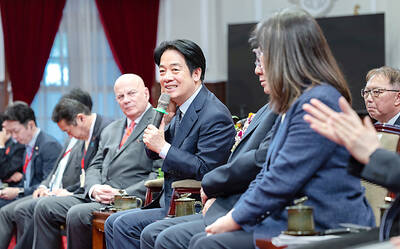Taiwan has received delivery from the US of some of its long-awaited AIM-120 medium-range air-to-air missiles, which will greatly boost the air force's strike capabilities, a defense source said.
The delivery was made in July in a shipment to the Hualien port in eastern Taiwan. Since then the AIM-120s have been stored near the Chiashan base, the country's largest shelter for fighter planes during times of war.
It is not known how many of AIM-120s ordered from the US have been delivered, but the number is believed to be sufficient for the air force to sustain a first wave of attacks from its Chinese counterpart.
The partial delivery of the AIM-120s is significant in two ways: first, it will greatly strengthen the air force's strike capabilities; second, it shows the US has lifted the restriction on the delivery of the missiles to Taiwan.
The restriction stipulated that the US would not deliver the AIM-120s to Taiwan before China acquired an equivalent weapon -- the Russian-made R-77 medium-range air-to-air missile. China is widely reported to have received a batch of R-77s from Russia early this year, which provides a sufficient reason for Taiwan to ask the US to remove the delivery restriction on the AIM-120s.
The AIM-120, for use on Taiwan's F-16s, is one of the best medium-range air-to-air missiles in the world. Before the arrival of the AIM-120s, the country's fighters had to rely on the outdated Sparrow missile for defense against hostile aircraft beyond visual range.
The US agreed to sell the AIM-120 to Taiwan early last year. Taiwan ordered 200 of the missiles and 292 launchers at a cost of US$150 million. The AIM-120 is also known as AMRAAM (advanced medium-range air-to-air missile).
Besides the AIM-120, the air force has two other kinds of medium-range air-to-air missiles in service for use with the French-made Mirage 2000-5 and domestically-built IDF planes. The two missiles are the Mica and Tien Chien-II (Sky Sword-II).
Before the delivery of the AIM-120s, the air force had sent two F-16 pilots to the US to test the missile.
The first of the two tests took place last October at a US base in Guam. The second test took place early this year at an air base in Arizona, where combat pilots from Taiwan are stationed to take F-16 flight training.
In the second test, the air force sent a total of eight pilots to test-fire AIM-120s from Taiwan-owned F-16s that are kept at the Arizona air base for training purposes.
Prior to the second test, the US had sent Taiwan an unidentified number of simulators for the AIM-120 to get F-16 pilots here familiar with the procedure for operating the state-of-the-art weapon.

Two US House of Representatives committees yesterday condemned China’s attempt to orchestrate a crash involving Vice President Hsiao Bi-khim’s (蕭美琴) car when she visited the Czech Republic last year as vice president-elect. Czech local media in March last year reported that a Chinese diplomat had run a red light while following Hsiao’s car from the airport, and Czech intelligence last week told local media that Chinese diplomats and agents had also planned to stage a demonstrative car collision. Hsiao on Saturday shared a Reuters news report on the incident through her account on social media platform X and wrote: “I

STILL ON THE TABLE: The government is not precluding advanced nuclear power generation if it is proven safer and the nuclear waste issue is solved, the premier said Taiwan is willing to be in step with the world by considering new methods of nuclear energy generation and to discuss alternative approaches to provide more stable power generation and help support industries, Premier Cho Jung-tai (卓榮泰) said yesterday. The government would continue to develop diverse and green energy solutions, which include considering advances in nuclear energy generation, he added. Cho’s remarks echoed President William Lai’s (賴清德) comments in an interview last month, saying the government is not precluding “advanced and newer nuclear power generation” if it is proven to be safer and the issue of nuclear waste is resolved. Lai’s comment had

‘BUILDING PARTNERSHIPS’: The US military’s aim is to continue to make any potential Chinese invasion more difficult than it already is, US General Ronald Clark said The likelihood of China invading Taiwan without contest is “very, very small” because the Taiwan Strait is under constant surveillance by multiple countries, a US general has said. General Ronald Clark, commanding officer of US Army Pacific (USARPAC), the US Army’s largest service component command, made the remarks during a dialogue hosted on Friday by Washington-based think tank the Center for Strategic and International Studies. Asked by the event host what the Chinese military has learned from its US counterpart over the years, Clark said that the first lesson is that the skill and will of US service members are “unmatched.” The second

STANDING TOGETHER: Amid China’s increasingly aggressive activities, nations must join forces in detecting and dealing with incursions, a Taiwanese official said Two senior Philippine officials and one former official yesterday attended the Taiwan International Ocean Forum in Taipei, the first high-level visit since the Philippines in April lifted a ban on such travel to Taiwan. The Ocean Affairs Council hosted the two-day event at the National Taiwan University Hospital International Convention Center. Philippine Navy spokesman Rear Admiral Roy Vincent Trinidad, Coast Guard spokesman Grand Commodore Jay Tarriela and former Philippine Presidential Communications Office assistant secretary Michel del Rosario participated in the forum. More than 100 officials, experts and entrepreneurs from 15 nations participated in the forum, which included discussions on countering China’s hybrid warfare